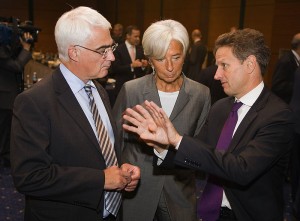Just last month I was lamenting the lack of G20 coordination ( See blog post “Maybe Dan Drezner was Right ….”) and admitting that Dan Drezner might be right when it came to G20 collective action.
This weekend we were witness to continuing lack of coordination in global governance – this the G7 Finance Ministers who just concluded a meeting in Marseilles (see their G7 Statement).
Don’t look for any coordinated efforts – you won’t find them. The most that they could do was to describe what Europe and the US is doing and then add rhetorical flourishes:
We are committed to a strong and coordinated international response to these challenges. We are taking strong actions to maintain financial stability, restore confidence and support growth. … Concerns over the pace and future of the recovery underscore the need for a concerted effort at a global level in support of strong, sustainable and balanced growth. We must all set out and implement ambitious and growth-friendly fiscal consolidation plans rooted within credible fiscal frameworks. Fiscal policy faces a delicate balancing act. Given the still fragile nature of the recovery, we must tread the difficult path of achieving fiscal adjustments plans while supporting economic activity, taking into account different national circumstances.
The problem is that officials are urging two different policy directions. The United States is urging stimulus while in Europe the focus is on debt and the need to support debt ridden countries including Greece but also Portugal Italy and Spain. In fact a crisis of sorts has presented itself in Europe with the resignation of the German member of the European Central Bank (ECB), Jurgen Stark. The bond purchasing by the ECB of Italian and Spanish bonds represented a broadening of the ECB mandate that has raised alarm in Germany. Stark had opposed bond purchasing by the ECB but he had remained loyal to the head of the ECB Jean-Claude Trichet. His resignation poses a dilemma for Chancellor Merkel.
So the US is pushing for short term stimulus – a la the Obama Jobs Program and Europe is tearing itself apart over how to deal with sovereign debt problems.
Now this brings us back to the issue of whether Europe can overcome the current sovereign debt crisis without ejecting various troublesome euro participants – Greece and possibly Portugal. Dick Rosecrance has bet on Europe overcoming the crisis and moving therefore to closer fiscal coordination. And Dan Drezner has kinda weighed in with the same view in his blog post Euro-deja-vu but recognizes that he’s seen this all before:
When I woke up this morning and scanned the headlines, I knew what I was going to blog about — the stories in the press about how the European Union was, after much hemming and hawing, beginning to move towards a closer fiscal union. I was then going to not-so-humblebrag about my own prediction that this would indeed happen. This was all going to be a great set-up to the last-minute reverse course — i.e., this Financial Times op-ed by German Finance Minister Wolfgang Schäuble in which he declared his “unease when some politicians and economists call on the eurozone to take a sudden leap into fiscal union and joint liability.”
Here’s the thing, however — if you read my eurozone blog post from this past February, you’ll see that almost the exact same dynamic played itself out six months ago. This time the Germans are pre-emptively balking before the peripheral countries can balk in response to German calls for austerity… but you get the general idea.
So, will it be closer fiscal union in the EU? Many smart people are betting on it. I’m not so sure. But we will come back to it. I generally disagree with Dick Rosecrance that the Europeans have acted before when facing a crisis. Therefore they will respond here as well. I am more inclined to accept that closer union is possible – but only after a number of countries are ejected from the eurozone – I think this is the Drezner line – and he may well be correct.
Meanwhile it is evident that there is no consensus on policy direction – at least if you look at the G7 Finance Ministers. You can imagine what that means for the G20. Finance Ministers have argued that there are different circumstances that drive policy differences by the G7 countries. But in reality there is disagreement among the G7 on how to attack the continuing financial crisis. It is unnerving.
Image Credit: Wikimedia Commons



Pingback: Lamenting The Deficit in Global Governance | Debt Consolidation Explained